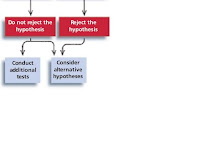
The statements made by Jake’s friends and family about what actions will help him remain healthy (for example, his mother’s advice to wear a hat) are in some part based on the advice-giver’s understanding of how our bodies resist colds.
Ideas about “how things work” are called hypotheses. Or, more formally, a hypothesis is a proposed explanation for one or more observations. All of us generate hypotheses about the causes of some phenomenon based on our understanding of the world (Figure 1.1). When Jake’s mom tells him to dress warmly in order to avoid colds, she is basing her advice on her belief in the fol lowing hypothesis: Becoming chilled makes an individual more susceptible to becoming ill.


1. Fruits and vegetables contain lots of vitamin C.
2. People with diets rich in fruits and vegetables are generally healthier than people who skimp on these food items.
3. Vitamin C is known to be an anti-inflammatory agent, reducing throat and nose irritation.
Given his lab partner’s experience and what he learned in class, Jake makes the following hypothesis:
Consuming vitamin C decreases the risk of catching a cold. This hypothesis makes sense. After all, Jake’s lab partner is healthy and Jake has made a logical case for why vitamin C is good cold prevention. This certainly seems like enough information on which to base his decision about how to proceed—he should start taking vitamin C supplements if he wants to avoid future colds. However, a word of caution: Just because a hypothesis seems logical does not mean that it is true. Consider the ancient hypothesis that the sun revolves around Earth, asserted by Aristotle in approximately 350 B.C.This hypothesis was logical, based on the observation that the sun appeared on the eastern horizon every day at sunrise and disappeared behind the western horizon at sunset. For two thousand years, this hypothesis was considered to be “a fact” by nearly all of Western society. To most people, the hypothesis made perfect sense, especially since the common religious belief in Western Europe was that Earth had been created and then surrounded by the vault of heaven. It was not until the early seventeenth century that this hypothesis was falsified as the result of observations made by Galileo Galilei of the movements of Venus. Galileo’s work helped to confirm Nicolai Copernicus’ more modern hypothesis that Earth revolves around the sun. So even though Jake’s hypothesis about vitamin C is perfectly logical, it
needs to be tested. Hypothesis testing is based on a process called deductive reasoningor deduction. Deduction involves making a specific predictionabout the outcome of an action or test based on observable facts. The prediction is the result we would expect from a particular test of the hypothesis.
Deductive reasoning takes the form of “if/then” statements. Aprediction based on the vitamin C hypothesis could be:
If vitamin C decreases the risk of catching a cold, then people who take vitamin C supplements with their regular diets will experience fewer colds than people who do not take supplements.
Deductive reasoning, with its resulting predictions, is a powerful method for testing hypotheses. However, the structure of such a statement means that hypotheses can be clearly rejected if untrue, but impossible to prove if they are true (Figure1.2). This shortcoming is illustrated using the “if/then” statement above. Consider the possible outcomes of a comparison between people who supplement with vitamin C and those who do not: People who take vitamin C supplements may suffer through more colds than people who do not, they may have the same number of colds as people who do not supplement, or supplementers may in fact experience fewer colds. What do these results tell Jake about his hypothesis?
If people who take vitamin C have more colds, or the same number of colds as those who do not supplement, the hypothesis that vitamin C alone provides protection against colds can be rejected. But what if people who supplement with vitamin C doexperience fewer colds? If this is the case, should Jake be out proclaiming the news, “Vitamin C—A Wonder Drug that Prevents the Common Cold”? No, he should not. Jake needs to be much more cautious than that; he can only say that he has supported and not disproven the hypothesis.
Why is it impossible to say that the hypothesis that vitamin C prevents colds is true? Primarily because there could be other factors (that is, there are alternative hypotheses) that explain why people with different vitamin-taking habits are different in their cold susceptibility. In other words, demonstrating the truth of the thenportion of a deductive statement does not guarantee that the if portion is true.
Consider the alternative hypothesis that frequent exercise reduces susceptibility to catching a cold. Perhaps people who take vitamin C supplements are more likely to engage in regular exercise than those who do not supplement. What if the alternative hypothesis were true? If so, the prediction that people who take vitamin C supplements experience fewer colds than people who do not supplement would be true, but not because the original hypothesis (vitamin C reduces the risk of cold) is true. Instead, people who take vitamin C supplements experience fewer colds than people who do not supplement because they are more likely to exercise, and it is exercise that reduces cold susceptibility.
